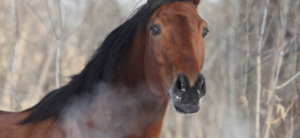 Eight Tips for Healthy Horse Lungs! Inclement weather, medical conditions, management-related issues, overstocking, and limited land. All of these factors play a role in how much time a horse spends indoors. Heaves, a condition in horses that is similar to asthma in humans. Confinement worsens it.
Eight Tips for Healthy Horse Lungs! Inclement weather, medical conditions, management-related issues, overstocking, and limited land. All of these factors play a role in how much time a horse spends indoors. Heaves, a condition in horses that is similar to asthma in humans. Confinement worsens it.
“Heaves, or recurrent airway obstruction, is a common and challenging problem in horses. In many cases it limits their athleticism and lifespan,” said Peter Huntington, B.V.Sc., M.A.C.V.Sc, director of nutrition, Kentucky Equine Research (Australia).
Experts recommend the following guidelines to maximize the respiratory health of horses affected by heaves:
- Maintain the horse outdoors as much as possible. Unless the horse has been diagnosed with pasture-associated heaves.
- Soak or steam hay to minimize the amount of dust and mold liberated from the hay that may be inhaled by your horse.
- When outdoors, avoid the use of round bales. Although convenient, horses tend to plunge their noses into the middle of the bale for prolonged periods of time while feasting. Thus inhaling mold spores and dust. Instead, spread the hay on the ground to promote drainage of mucus from respiratory passages.
- Even indoors, spread the hay on the horse’s stall floor instead of using a haynet or other elevated feeding device.
- Never muck stalls, sweep aisles, or otherwise clean the barn while a horse with heaves is indoors.
- Replace straw bedding with a low-dust alternative such as shredded paper, specialized cardboard products, or even simple rubber matting with a thin layer of absorptive material. Some horses will object to urine splashing on their legs. Some type of bedding will be needed.
- Supplement the diet with the long-chain omega-3 fatty acids docosahexaenoic acid (DHA) and eicosapentaenoic acid (EPA), as these have been shown to reduce inflammation in the lungs. EO-3, a potent marine-derived oil rich in DHA and EPA, is a palatable oil that is top-dressed onto the feed.
Nappie Benefits:
- Try an equine diaper (nappie). According to one study*, ammonia, found in horse urine, causes inflammation of the respiratory tract lining. It is undesirable in a horse with heaves. Horses without a diaper had more than 4 parts per million (ppm) ammonia in their stall after 42 hours, whereas horses fitted with a diaper had less than 1 ppm ammonia in their stall in the same time period. Moreover, horses exposed to higher ammonia levels had decreased feed intake. These results prompted the researchers to conclude that “fitting the diaper effectively decreased exposure of horses to ammonia gas, helped keep the horse in good health, and in addition lowered the cost of bedding.” A nappie, however healthy for a horse, may not be a practical solution for most horse owners.
“In sum, take all possible precautions to protecting your horse’s breathing zone. The two-foot sphere around his nose from where he draws his breath,” advised Huntington.
Resources:
In conclusion, do you have questions about these Eight Tips for Healthy Horse Lungs? Contact us at J & J Hay Farms by clicking here!
*Matsui, A., Y. Inoue, and Y. Asai. 2003. The effect of putting the bag with collecting feces and urea (“equine diaper”) to the ammonia gases concentrate in horse’s pen. Journal of Equine Science. 14(3):75-79.
